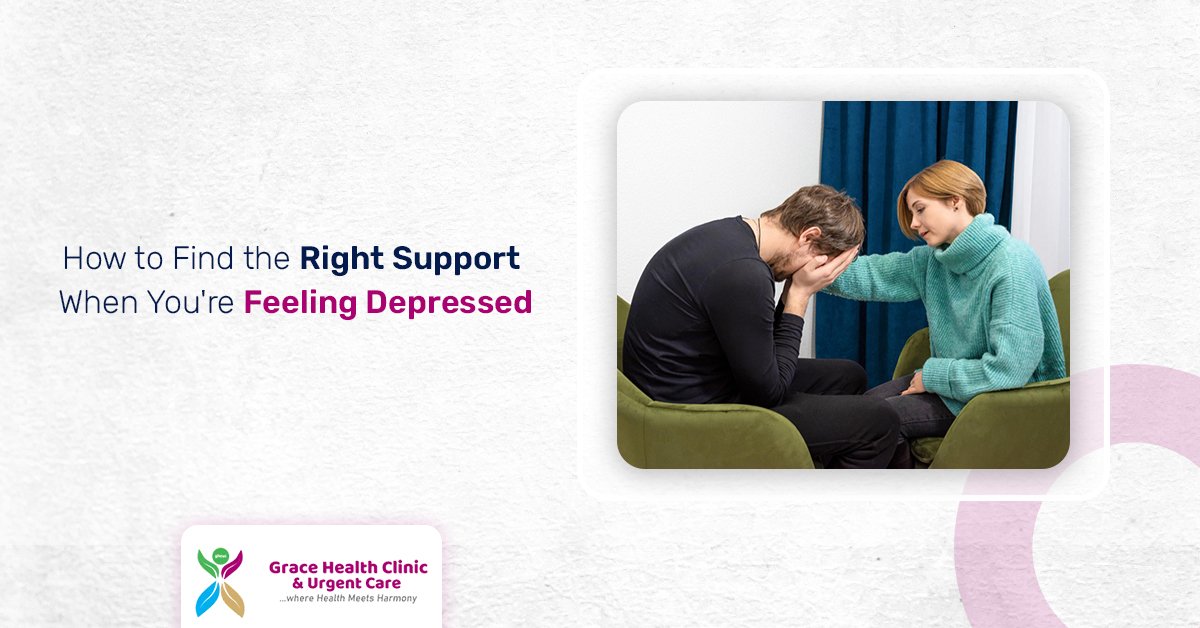It is quite normal to feel down or sad sometimes. However, if it persists or disrupts everyday activities, it might be depression.
Someone can assist you when you are tired, bored or feel something is wrong.
At Grace Health Clinic & Urgent Care, we always consider your emotional health in the same manner we consider your physical health. Here are some straightforward steps to help you find the proper support.
Understanding Depression: What You’re Really Facing
Depression is a serious mental health condition, not a weakness. It affects millions of people around the world. The symptoms can include:
- Low mood or sadness that is persistent
- Dependency on activities previously of interest
- Exhaustion and tiredness
- Disruption in sleep
- Inability to concentrate or to decide
- Feelings of inadequacy or regret
- Thoughts of self-injury or suicide
Understanding of such symptoms is one step toward seeking support, and it is permissible.
Grace Health Clinic & Urgent Care provides complete mental health assessments in an effort to help identify what you’re facing and how we can help.
How to Find the Right Support When You’re Feeling Depressed
Start with Self-Awareness
A challenging step is acknowledging that you’re not fine. But recognizing your emotions and mental state is a powerful thing.
There is no sense in self-diagnosis, you need only follow your gut if something seems wrong. Healing is established through the doorway of acknowledgment.
Reach Out to Trusted People
Your initial support often comes from those around you:
- Family members who are concerned with your well-being
- Close friends who are non-judgmental sources of emotional support
- Coworkers or classmates who may understand more than you realize
It might seem harsh, but starting a simple conversation can help. I have been feeling deficient in the last couple of days and need somebody to talk to. I ought to begin seeking meaningful help.
Look into Community Resources and Support Groups
You are not the only one; support groups can prove this point. The support groups enable people to connect and exchange stories and motivation. Consider exploring:
- Local support groups through hospitals or mental health centers
- Online support groups through such a network as Facebook or Reddit
People with similar issues can feel healed and inspired when interacting with others.
Talk to a Primary Care Doctor
Sometimes, depression may be related to physical health, such as a hormone imbalance or a long-term condition.
Paying a short visit to your doctor can help:
- Rule out other medical issues
- Provide a referral to a therapist or psychiatrist
- Start a treatment plan that fits your needs
At Grace Health Clinic & Urgent Care, our providers care for your body and mind. We’re here to listen and guide you towards the right care.
Talk to a Mental Health Professional
As soon as depression starts to affect your everyday life, getting the assistance of professionals is necessary. Counselors are qualified to provide professional advice and treatment plans that are unique.
Types of professionals to consider:
- Psychologists: Direct attention to counseling and mental health check-ups
- Psychiatrists: They can prescribe drugs and treat severe mental illnesses
- Therapists and Counselors: Provide talk therapy, such as CBT and solution-focused therapy
- Social Workers: Provide emotional support and facilitate access to resources
Verify the certified experts in your vicinity or utilize the online directory.
A professional can help you:
- Recognize your feelings and thoughts
- Learn coping strategies that work
- Outline small, sensible goals for healing
- Identify the suitable solution, whether it’s therapy, medication, or both
At Grace Health Clinic & Urgent Care, Dr. Abisola Onashile provides therapy and psychiatry services, including CBT and personalized diagnoses.
Create a Crisis Plan for Emergency Situations
In case you experience suicidal or self-harming thoughts, immediately contact for help. You can:
- Call 911 or go to the closest urgent care
- Call the Suicide & Crisis Helpline at 988
- Use crisis text lines by texting “HELLO” to 741741 in the United States.
You can also contact Grace Health Clinic for an emergency mental health appointment.
Practice Self-Care Alongside Professional Help
While searching for external help, it is also important to support yourself internally. Self-care is not a cure for depression, but it may be an addition to treatment and relieve everyday life. Consider:
- Staying on a routine to be stable
- Activities such as exercising regularly to enhance natural painkillers
- Going to bed at a good time to promote brain wellness
- Eating nutritious meals to nourish your body and mind
- Engaging in mindfulness or meditation as a method of reducing intrusive thoughts
Simple habits can help you reclaim moments of peace.
Final Thoughts
Depression is tough. But you can share the burden.
Some people care about you. Get assistance from professionals. Take small steps to achieve change.
If you or someone you know is facing depression or emotional issues, remember help is here.
Dr. Abisola Onashile is a highly experienced provider who offers complete care for both physical and mental well-being. If something doesn’t feel right, don’t wait, reach out today.
Get help for your mental health at Grace Health Clinic & Urgent Care. Call 360-200-1696 or visit www.gracehealthclinicuc.com.
FAQs
Q: How do I know if I’m really depressed or just sad?
Depression represents an extended disorder that influences routine activities. Grace Health Clinic can help you determine the difference.
Q: Can I get better without professional help?
While self-care is essential, most people benefit from talking to a trained professional. Dr. Abisola Onashile will help create a plan that works best for you.


